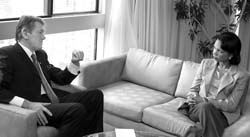Domestic challenges and the president’s global initiatives

President Viktor Yushchenko was hardly in a festive mood when he arrived in New York for the UN’s 60th anniversary celebrations. The domestic political situation on the eve of his visit was far less favorable than just a few months before. As recently as in April, Ukrainian diplomacy was trumpeting the president’s triumphal visit to the US. Now that the new leadership is beset with a host of problems (from reciprocal accusations of malfeasance to the economic slump), what has remained of the previous delight is increased scrutiny, and not necessarily positive.
Yet, it would be wrong to say that everything has gone awry. In any case, Ukraine attached considerable importance to the president’s appearance at the UN General Assembly session, and by all accounts his speech met the expectations of numerous experts. Apart from making a perfunctory declaration concerning Kyiv’s intention to defend democracy all over the world, President Yushchenko emphasized two pivotal points. First, he urged the international community to recognize the 1932-1933 Holodomor as an act of genocide against the Ukrainian people. Second, while speaking to UN Secretary General Kofi Annan, Yushchenko raised the question of holding a special UN-sponsored conference next year to commemorate the 20th anniversary of the Chornobyl tragedy.
There will be few serious problems connected with the Chornobyl question. Still, some obstacles may crop up in the wake of a recent report by the members of the Chernobyl Forum, high-profile representatives of the UN, WHO, and IAEA, who played down the magnitude of the 1986 disaster. Such developments will only harm the UN.
Recognizing the Holodomor as genocide has been mooted at the UN before. In the fall of 2003 Ukrainian embassies throughout the world organized mourning ceremonies timed to the 70th anniversary of the tragedy. Ukrainian diplomats did their best to call for a UN vote on a special motion to recognize the Holodomor as genocide. Their efforts resulted only in a joint declaration to which several dozen countries affixed their signatures. Predictably, this document did not contain the word “genocide.” Ukrainian diplomats said this was the result of pressure from the American, British, and Russian representatives. Those countries may have changed their attitude (except, of course, the USSR’s legal successor Russia, which is afraid of being held responsible for the Soviet regime’s policies), but it will still take a Herculean effort by our diplomats to make their foreign counterparts aware of the importance and sensitivity of this issue for Ukraine. Incidentally, Ukraine’s Permanent Representative at the UN Valeriy Kuchynsky has said that the question of recognizing the Holodomor as an act of genocide may be raised at the UN in 2007 (the tragedy’s 75th anniversary).
During his visit to the UN, the president of Ukraine held four bilateral meetings with foreign leaders — the prime minister of Belgium and the presidents of Brazil, Iran, and Nigeria. President Yushchenko also conferred with US Secretary of State Condoleezza Rice (on photo). The presidential press service reports that they discussed “the current political situation in Ukraine.” The president noted in particular that his decision to fire the cabinet and the National Security and Defense Council secretary “was aimed at stabilizing the situation in the country and pressing forward with reforms.”






